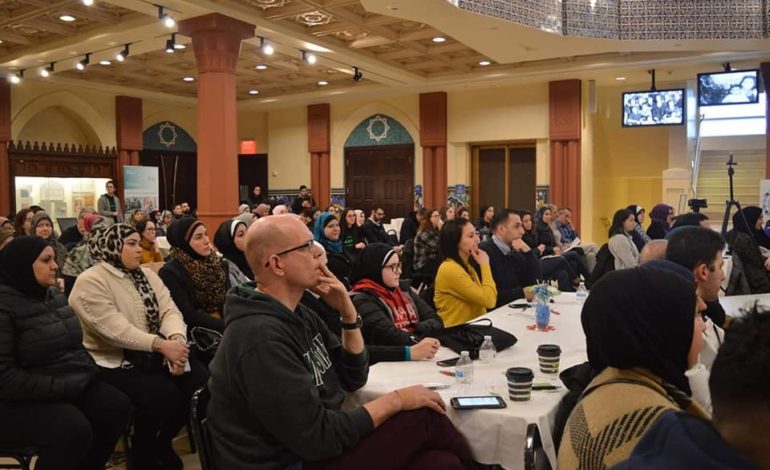DEARBORN — On Saturday, March 2, the Arab American Health Initiative and Blue Hands United for Autism held a community debate on vaccines and autism at the Arab American National Museum courtyard.
Nearly 120 attendees were present, including community and organization members and panelists in the medical profession or parent community.
Sisters Mariam and Marwa Ayyash co-founded the nonprofit AAHI, which highlights healthcare needs, including reducing health disparities and fighting stigmas within the Arab American community.
The youth-led organization focuses on improving the health quality of life for Arab Americans and motivating youth to chase their dreams through dedication and community outreach.
The mission of the Dearborn-based Blue Hands United for Autism is to bring autism awareness to the community.
Panel members included Alex El Sabbagh, M.D., Mouhanad Hammami, M.D., Rima Charara, PharmD, Nadia Hamade, PA-C, and Mona Alaquie, co-founder of Blue Hands United.
According to the American Public Health Association, protecting babies and children against dangerous diseases is a core mission of public health.
“Every day, in health departments across the nation, someone is working on maintaining and improving childhood vaccination rates and keeping diseases like measles and mumps from regaining a foothold in the U.S.”
There are various types of vaccines with different purposes. The Measles, Mumps, and Rubella (MMR) vaccine is an attenuated live vaccine that helps create a long-lasting response and protection against MMR. two doses are recommended; the first dose between 12-15 months of age and the second dose at 4- 6-years-old.
Hammami, a pediatrician currently based at Trinity Health, who takes on many public health roles in communities nationwide, described the topic of vaccination alone as very sensitive and important for the community.
“Due to vaccines, we were able to reduce and almost eradicate preventable diseases,” he said. “Those are life-threatening diseases.”
Hamade, an internal medicine physician assistant, contradicted Hammami’s statement and argued that the ingredients in vaccines are very toxic and may cause autism.
She shared an example of a very common active ingredient, monosodium glutamate (MSG), that could lead to cell death and lead to further changes in one’s body.
For his part, El Sabbagh, another pediatrician based in Dearborn, said autism can be caused as a result of stress from a traumatic event such as undergoing a procedure to remove tonsils, thus stating there is no link between vaccines and autism.
“Everyone has some part of the puzzle,” said Charara, a pharmacist in Dearborn, about the debate on vaccines and autism. “We need to mainly educate the community.”
She emphasized that people can get together as a community on maintaining the health of young children, focusing on the importance of education and the access to information online. She pointed out that many people can acquire false information.
“Even though people do not vaccinate their children, autism is still on the rise,” she said.
Alaouie told attendees about the perspective of the parents when it comes to vaccinating their children. She told the other panel members she had many of her own questions as a parent.
She emphasized the important role pediatricians play when educating parents and patients. She urged pediatricians not to exclude nonvaccinated patients from their clinics, but to work with ethics and morality to help others heal. She also encouraged people to ask more questions.
Community members ask questions
Lara, a public health student at the University of Michigan, asked about the care of patients in underprivileged communities. She mentioned her previous experience working with a minority Somali community in Minnesota and now she has similar regards with the Syrian refugee community in Michigan.
Many other community members were concerned about the active and inactive ingredients in vaccines; others were worried about the separate doses.
For information on the importance of childhood vaccines, visit https://www.cdc.gov/vaccines/vac-gen/howvpd.htm
To learn more on the ingredients in vaccines, visit https://www.cdc.gov/vaccines/vac-gen/additives.htm






Leave a Reply